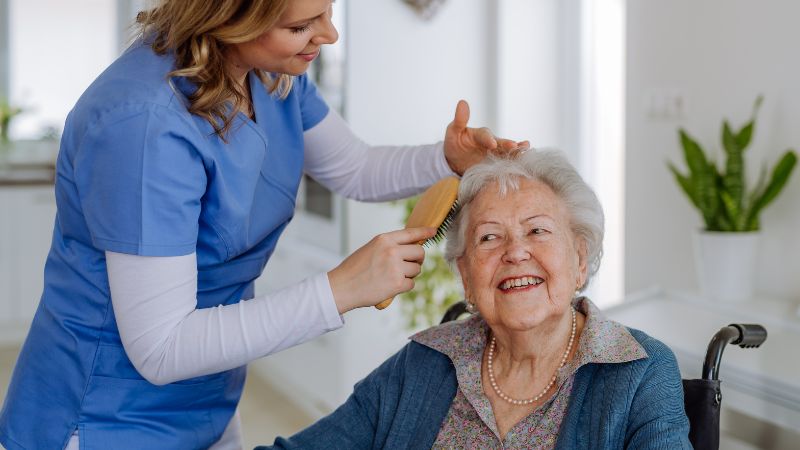People often take their senses of taste, touch, smell, sound, and sight for granted, rarely pausing to consider how much they contribute to everyday experiences. It is only when these senses begin to deteriorate with age that their true value is truly appreciated. For example, the joy of tasting a favorite meal, the comfort of a loved one’s touch, the refreshing scent of a spring morning, the melody of a favorite song, and the beauty of a sunset all become more precious.
For seniors with dementia, a gradual decline in sensory functions is common, and this can lead to feelings of isolation and frustration. Sensory stimulation activities, such as aromatherapy, tactile exercises, music therapy, and visual arts, can be particularly beneficial. These activities help to engage the senses, stimulate the brain, and provide a sense of connection and enjoyment, enhancing the quality of life for those living with cognitive impairments.
How does dementia affect the senses?
Dementia is a disorder that is known to impact brain functions. Memory, thinking, and problem-solving abilities progressively deteriorate. Dementia, however, affects the entire brain, which means that the senses will likely undergo gradual deterioration in seniors living with the disorder.
The five senses allow people to connect with their environment. But as hearing declines, a senior’s ability to communicate will be negatively affected. Practical, daily functions are also impacted. A senior who loses her hearing will not hear the doorbell, phone, or television.
Distinct senses, like smell and taste, are linked and undergo changes in dementia patients. Someone without a strong sense of smell will not smell smoke from a house fire. A lack of taste can lead to the senior consuming spoiled food or putting inedible objects in her mouth.
The sense of touch is an important contributor to well-being. A senior whose sense of touch deteriorates will not be able to discern how hot is running tap water. Physical touch is also necessary for human interactions; its loss can lead to isolation and reduce a senior’s quality of life.
How does sensory stimulation help?
A senior with dementia can remain engaged with her environment through sensory stimulation therapy. Everyday objects can stimulate the senses and bring back positive memories and emotions. By arousing any of the five senses, the senior will experience improved mood, self-esteem, and well-being.
Sensory stimulation helps dementia patients express themselves when they are unable to communicate using words. Common items, such as family photo albums or old books with antiquated smells, can trigger emotions, thereby encouraging emotions in and responses from the senior.
Creating sensory experiences requires the caregiver to sit near the senior, so that she is able to see and hear the caregiver. Upon presenting ordinary objects, allow the dementia patient to explore them. Talk about the objects in a way that triggers positive memories.
1. Stimulation via Hearing
Stimulating a senior’s sense of hearing can induce relaxation and cognition. Sounds can also enhance their mood. Older individuals often have a hard time hearing, so it is important to adjust the level of the sounds for maximum benefit. Connect with a senior’s sense of hearing using technology.
Consider playing natural sounds, like waves crashing on a beach or a gentle rainforest rainfall, from a smartphone. Or, turn on the radio to play classical music or favorite songs from the senior’s youth. Caregivers may recite poetry or sing to connect with the senior and trigger auditory senses.
The following are activities that can help with hearing stimulation:
- Listen to music
- Put on a radio show
- Listen to sounds of nature on a smartphone or take them on a safe outing to experience the sounds of nature firsthand
2. Stimulation via Touch
Through an awareness of texture and touch, a senior will benefit. Tactile stimulation is known to increase the well-being of dementia patients. Holding an object stimulates brain paths; thousands of nerve receptors in the fingers are stimulated, which in turn stimulates the brain.
Stimulate a senior’s sense of touch by offering a bowl of sand with seashells, stones, and balls. A virtual beach can trigger fond memories in the senior. Alternate routes to tactile stimulation include offering pinecones, sandpaper, or plastic fruits.
The following are activities that can help with touch stimulation:
- Folding clothing
- Knitting or crocheting
- Playing card games
- Organizing silverware, clothing, or a junk drawer
- Sensory boxes that contain items like seashells, stones, furs, and more
- Painting or drawing
- Squish bags that can be safely squeezed
3. Stimulation via Sight
Visual processes are adversely affected in seniors living with dementia. Visual therapies may be successfully used to stimulate the sense of sight. Light therapy, for instance, is known to reduce wandering, improve sleep cycles, and enhance cognitive and behavioral functioning.
Lift a senior’s spirit, while simultaneously stimulating the senses, by placing photos of loved ones in the surrounding environment. Watch favorite movies with easy-to-follow plots; doing so can help the senior recollect some scenes. Movies add the dual benefit of auditory stimulation.
The following are activities that can help with sight stimulation:
- Looking at family photo albums and making picture boards
- Simple board games or card games
- Watching movies and TV shows
- Painting and drawing
4. Stimulation via Smell
Strong scents can instantly transport a senior to a memorable time or immediately connect the individual to specific occasions in the past. Trigger these fond memories using olfactory stimulation. Aromatherapy using essential oils is one way to deliver healing properties.
Essential oils, like lavender, are known for their calming effects. Peppermint is used to stimulate the brain and calm nerves. Bergamot elevates the mood and relieves mild anxiety. Alternately, ignite a scent diffuser with an aroma of suntan oil. Scented candles may also be used in olfactory stimulation.
The following are activities that can help with smell stimulation:
- Burning candles or incense
- Cooking and baking
- Arranging flowers
- Using essential oils with an oil diffuser
5. Stimulation via Taste
Eating favorite foods can help a senior recall a memorable past event. For example, a senior who traveled to the seaside as a child will welcome sharing a bowl of clam chowder with a caregiver or family member. Iced tea can take a senior back to a carefree childhood.
Seniors living with dementia interact differently with the world around them. Their challenges influence how they communicate, behave, and relate to others. Families who enlist the help of dementia caregivers from Assisting Hands Home Care give their loved ones a chance to flourish.
The following are activities that can help with taste stimulation:
- Serving favorite foods and desserts
- Making smoothies
- Cooking or baking their favorites foods and desserts to enjoy
Memory Care from Assisting Hands Home Care

Assisting Hands Home Care offers trusted memory care services that are relied upon by countless families and their elderly loved ones. Our dementia caregivers are highly qualified and trained to manage the various symptoms of dementia with utmost compassion, ensuring the safety and well-being of those in our care.
One common symptom of dementia is forgetfulness, which our caregivers can recognize. When dementia patients wander, our skilled caregivers gently guide them to a safe location and monitor them closely. We also manage agitation, helping seniors calm down and feel more secure.
At Assisting Hands Home Care, we provide comprehensive dementia care services that include assistance with activities of daily living (ADLs), such as personal hygiene, transportation, and medication reminders. We strive to build meaningful relationships with our care recipients to prevent isolation and loneliness, offering not just care, but companionship as well.
Our in-home memory care services are among the most reputable in the area. If your elderly loved one lives in Hinsdale, Downers Grove, Oak Brook, La Grange, Illinois or nearby Cook or DuPage counties, call us at (630) 407-1932 to consult Assisting Hands Home Care for reliable home care. We’ll develop a flexible care plan to meet your loved one’s care needs.
















